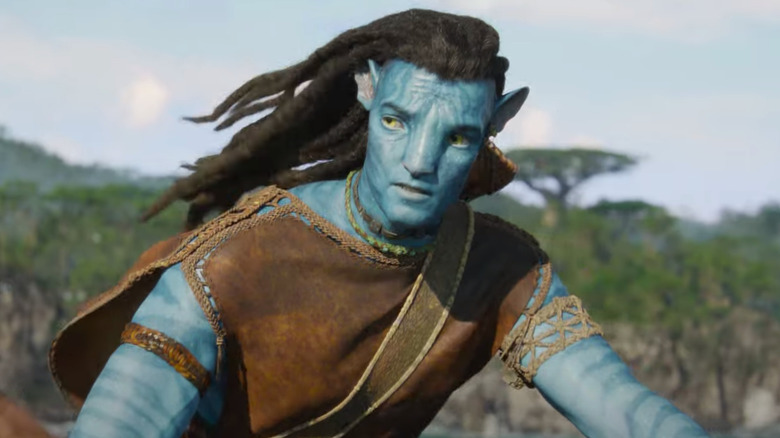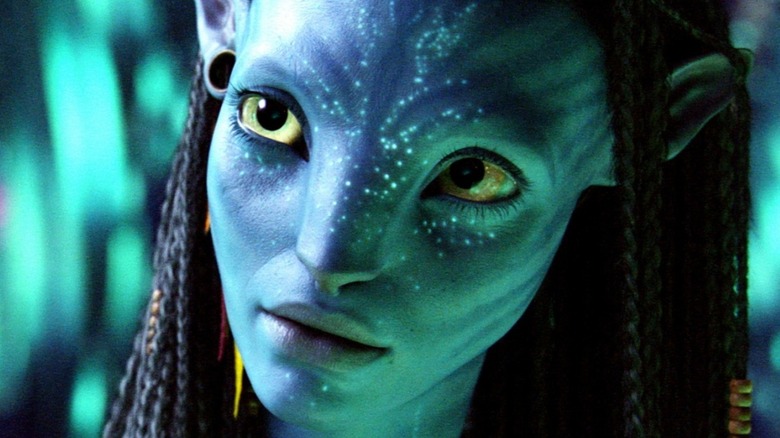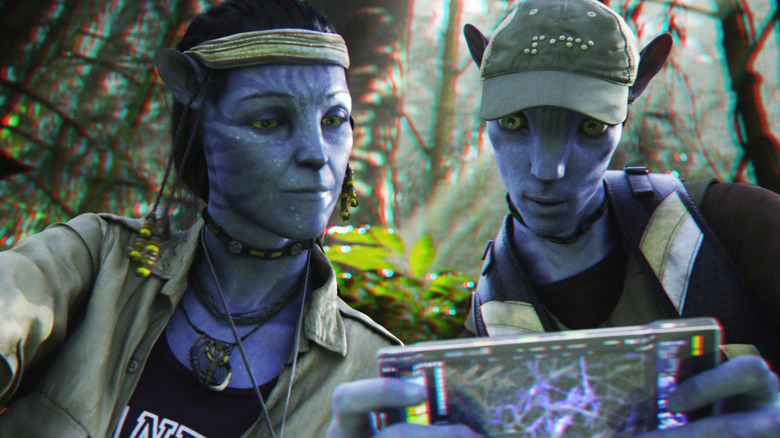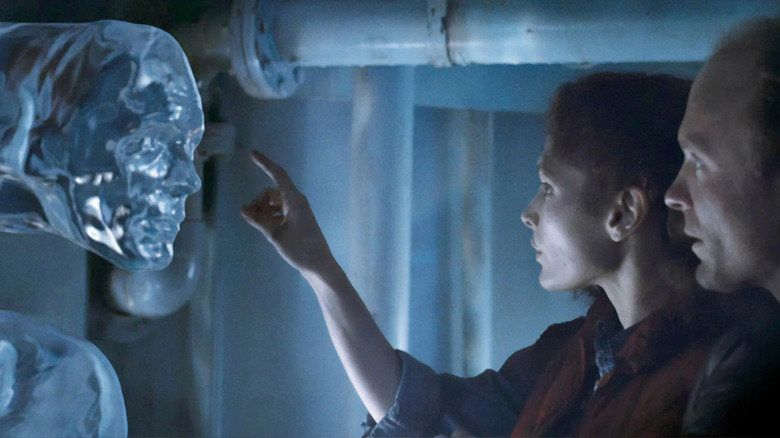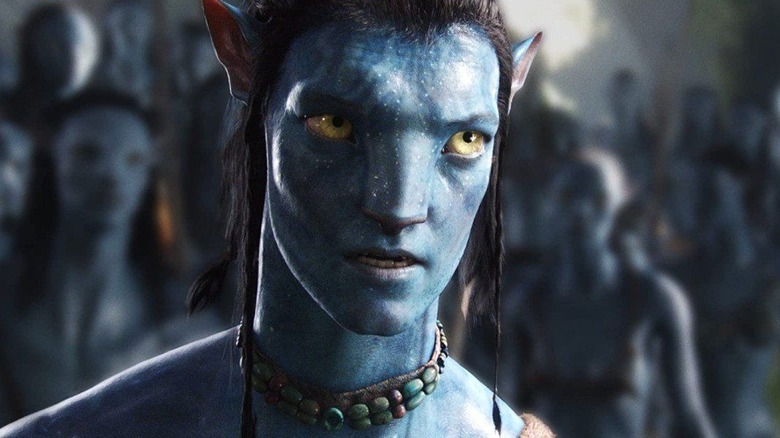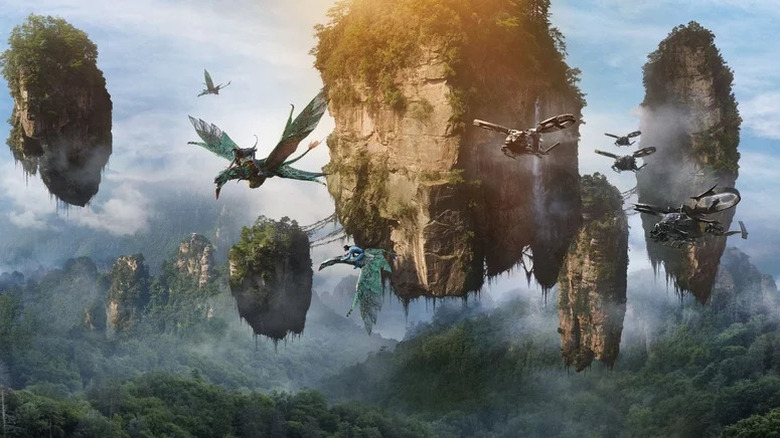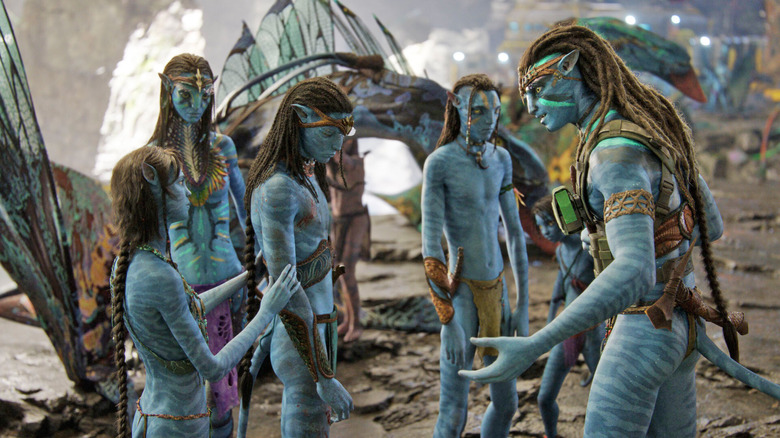Popular Avatar Fan Theories Debunked
In 2016, the Oxford English Dictionary named "post-truth" its word of the year. The hyphened unit of language rose in popularity due to misinformation spread in and around the 2016 U.S. Presidential Election and Brexit reform, but "post-truth" was already the state of many film Reddits and message boards. That's what fan theories are — post-truth.
That isn't meant judgmentally. Engaging with art means piquing your curiosity as a viewer, and the desire to unpack a movie beyond its offered pale is valid. That said, it's also often an exercise in labyrinthine overthinking and self-projection. People want to see themselves in the art they love. So often, that's one reason they do love it. But the fan theories surrounding many films, including James Cameron's massive blockbuster "Avatar," contradict the movie itself. It's worth debunking the fan theories that fly in the face of the artists that made it, to get back to the truth of what they intended. Here are some of the most popular theories about James Cameron's "Avatar," debunked.
Theory: Jake was brainwashed by Pandora
It's been 13 years since James Cameron's "Avatar" released in theaters, which means fans have had more than a decade to craft their theories about it. A popular one covered by the web compendium Mental Floss dates back to 2012. Reddit user scottmale24 claimed that Jake Sully (Sam Worthington) didn't actually fall in love with Neytiri (Zoe Saldana). The user stated that "Pandora functions as a giant and incredibly neural network, and essentially rewrites Jake Sully's mind to protect one of it's primary networking hubs." Put another way: it brainwashes him. One could interpolate that Jake's desire to have "a single thing worth fighting for" in life is evidence he's been highly susceptible to brainwashing. The issue with this theory is that "Avatar" agrees with it up to a point. Jake is highly susceptible to brainwashing and groupthink programming — that's partly why he joined the Marines.
Jake Sully has, in his own words, wanted something worth fighting for. He believed that was the Marines and their cause. Once Jake falls in love, however, that perspective shifts. He feels awake for the first time, and his value system changes. Sully realizes he's been a proponent of spreading bigotry and fascism across the known universe, made abundantly clear when Colonel Quaritch (Stephen Lang) claims they're going to "blast a crater in their racial memory so deep, that they won't come within 1,000 klicks of this place ever again." "Avatar" only works as a treatise on programming if Jake has agency, and it absolutely wants to deliver a cautionary message through its battle scenes and imagery.
Theory: Pandora drives human visitors insane
A fascinating trend among "Avatar" fan theories is a distrust of the way humans act within the movie. To be fair, the film's non-Na'vi leads — from Colonel Quaritch to Dr. Augustine (Sigourney Weaver) to Norm (Joel David Moore) — are a broadly drawn bunch. Searching for or trying to explain their motivations is understandable. That's the catalyst for Reddit user Scotscin's "Avatar" fan theory that Pandora actually drives humans insane.
Scotscin observes that Dr. Augustine describes Pandora as "the most hostile environment known to man." And to Scotscin's credit, this line is incredibly suspect. Pandora seems almost entirely plague-free and can be traversed with a basic filtration mask. The ocean depths of James Cameron's own "The Abyss" seem more fraught with peril than Pandora. Could there be another reason the alien planet is so dangerous? Scotscin's explanation is that the planet's environment mentally grinds humans down.
Take Quaritch as a primary example. The man is a decorated soldier with an impressive resume but, by the time fans meet him, seems prone to erratic behavior and poorly calculated military maneuvers. He's been on Pandora longer than any other human. Add to that Norm's recommendation that Jake make a video log lest he go insane and the fact that Pandora's primary resource, unobtanium, causes severe reactions in humans and Scotscin's theory gets more and more compelling. So, rather than debunk it entirely, it's time to examine the way humans behave in "Avatar," specifically through the lens of other James Cameron movies.
James Cameron movies are about surviving pressure
In the works of James Cameron, men crumble or thrive in the face of world-shifting pressures. The sinking of the Titanic brings out the best in Jack and the worst in Cal. The events of "The Abyss" leave Hiram Coffey (Michael Biehn) suffering from high-pressure nervous syndrome and making increasingly paranoid, unadvisable decisions (like arming a warhead to attack an animated and intelligent column of water — "The Abyss" is wild).
In both these films, it is the way men of character face unimaginable circumstances that determines their heroism. True heroes, Cameron postulates, remain mentally strong against all odds. James Cameron himself has had to survive shooting his own movies. Lesser individuals or soon-to-be villains can't hold it together.
So Scotscin isn't exactly wrong. It could very well be that Pandora is driving people crazy. Cameron's oeuvre, though, suggests that the point isn't whether it is or isn't. It's how the characters react to the pressure Pandora causes. Labeling Quaritch crazy softens the decisions he makes because he can, effectively, plead insanity where they're concerned. Insanity can't explain his pervasive bigotry or his vile thirst for power. Pandora, like The Abyss and the Titanic and the surface of LV-426, reveals Quaritch for who he really is. That's more important to Cameron than the "why."
Theory: The Na'vi aren't native to Pandora
To understate the obvious, "Avatar" shares a lot in common with "Dances with Wolves." Both moves are about bruised and disillusioned military lifers rediscovering their humanity while in the care of Indigenous people. James Cameron has even admitted this is the case. In an interview for the L.A. Times, Cameron was bluntly asked if Kevin Costner's Academy Award-winning epic was a reference point for him and Cameron didn't mince words:
"Yes, exactly, it is very much like that ... There was some beautiful stuff in that film. I just gathered all this stuff in and then you look at it through the lens of science fiction and it comes out looking very different but is still recognizable in a universal story way. It's almost comfortable for the audience — 'I know what kind of tale this is.' They're not just sitting there scratching their heads, they're enjoying it and being taken along. And we still have turns and surprises in it, too, things you don't see coming. But the idea that you feel like you are in a classic story, a story that could have been shaped by Rudyard Kipling or Edgar Rice Burroughs."
Filmmakers aren't always that transparent about their intentions, so credit to Cameron where it's due here. This is less about proving one long-standing "Avatar" fan theory, however, than it is about debunking another, one that hinges on the idea the Na'vi aren't native to Pandora. Let's dive in.
Thematically, the Na'vi must be native to Pandora
According to Reddit user ParameciaAntic, it's entirely possible the Na'vi aren't native to Pandora: "All of the other large animals shown on Pandora display a hexapodal body plan, more than two eyes, multiple breathing apertures along their necks, four digits, and have two nerve stalks." Whereas the Na'vi "only have four limbs, two eyes, apparently only breathe through their mouth and nose, three digits, and only have one ponytail nerve stalk."
This is, to be fair, a legitimate observation. The Na'vi have evolved in different ways than their animal counterparts. To be blunt, though, this is also how evolution works. The Na'vi have changed at a fundamental physical level and don't require the same resources to navigate Pandora as many of the lifeforms there. This is far more likely than what ParameciaAntic goes on to suggest, which is that the Na'vi were genetically engineered and raised by another race before being deposited on Pandora.
This development would directly fly in the face of plot points and film references that James Cameron has specifically acknowledged. It flies in the face of the film's core critique of militaristically demolishing the natural world for the sake of might. If the Na'vi aren't native to Pandora, "Avatar" isn't "Avatar." Film theories can be well and good, but when they transform the very heart of a movie, they should be debunked with haste. Such is the case here.
Theory: Humans are juggernauts on Pandora
It's clear to anyone that's seen "Avatar" (or any movie in which humans visit a planet other than Earth) that alien planets affect homo sapien bodies. The rules of the environment are different, and physiological systems react accordingly. This is all very dry and blasé, but it's worth establishing because of a fan theory from Reddit user MegaTreeSeed that explores how and why humans should be stronger on Pandora than the Na'vi. MegaTreeSeed argues that "Avatar" establishes that Pandora's gravity is much lower than Earth's. That's supported, in turn, by the size of visible flora and fauna on the planet.
Okay, fair enough! MegaTreeSeed goes on to theorize that "humans on Pandora would actually have a much lower terminal velocity than they do on Earth, maybe to the point of making falls pretty much non-lethal, or at least less dangerous. The atmosphere on Pandora is at least as thick as Earth's, given by the fact no pressure suits are needed." All in all, this would make humans juggernauts on Pandora and an even more credible threat to the Na'vi than they appear to be in the movie. So what keeps this theory from holding water? Simple: the other rules of Pandora.
Physiology and the environment
According to an article published in the National Library of Medicine by scientific researchers Frank Seebacher and Craig E. Franklin, physiology acts as a filter between environmental changes, and ecology and biodiversity. Put more simply: the entire environment affects human existence. Even if Pandora has a lower gravity than Earth and even if that massive change would give human bodies a lower terminal velocity than they have on Earth, there are other established rules to life on Pandora that might affect those factors adversely.
How would air and oxygen flow function in the Hallelujah Mountains (which were inspired by Zhangjiajie National Forest Park)? What of the mental stresses Pandora puts on homo sapiens? These factors alone might contribute to the ways gravity and terminal velocity function for humans venturing into Pandora's wilds.
As fun as it is to parse apart the world James Cameron built, "Avatar" also asks audiences to trust its world-building makes sense. To think too hard about human physiology on the planet is to mistake the forest for the trees and, in the case of Pandora, some parts of that forest are floating and are awesome. That's where attention should be paid.
Theory: Pandora is an ancient alien resort
There's a long and proud tradition of giving rich folks what they deserve in high-tech amusement centers. "The Lost World" is a good example. "Ready or Not," in which a family of one-percenters plays a game and meets their comeuppance, is a more recent addition. Beyond that, there are shows like HBO's "The White Lotus" and Peacock's "The Retreat," both of which examine the class warfare that can be an undercurrent at high-end resorts.
James Cameron's "Avatar" doesn't look like an addition to this canon on paper, but Reddit user devilsbard thinks it might be. His theory is that Pandora "was engineered as a getaway for ... a bunch of rich alien tourists [who] got stranded in the 'Westworld' type place and over many generations ... became the Na'vi we see in the movie." He cites the difference between the Na'vi and other native animals on Pandora, plus unobtanium's unnatural function within Pandora's ecosystem. Perhaps someone placed it there as part of a larger project?
Admittedly, this theory is fascinating. That said, it undercuts one of the key themes of "Avatar." James Cameron's movie is profoundly interested in whether humans and the most hard-nosed among them are able to evolve. Jake seems like the last person who would turn from colonizing a planet to rising up and fighting for the Na'vi. When he does, other humans follow. If the Na'vi are native to Pandora and don't evolve out of the planet's ecosystem, their presence on Pandora is less thematically profound. That alone is enough to debunk the idea that Pandora was once a theme park. (On the plus side, Pandora is a theme park now.)
Theory: Avatar and the Fast & Furious movies take place in the same universe
"Avatar" is about found family. "The Fast and the Furious" franchise is all about family, found or not. Over the course of nine insane movies, the Toretto's and their brethren have gone from DVD player thieves to astronauts without ever forgetting that family trumps all. It isn't silly to want to link "Avatar" and the "Fast & Furious" universe together, however disparate they might be. They're both blockbuster works of entertainment with solid values. So Reddit user arbitrary_human gave it a shot several years ago.
Their theory: it all runs through Letty (Michelle Rodriguez). Rodriguez plays Trudy Chacón in "Avatar" and, according to arbitrary_human, "Letty enlists with the paramilitary force and becomes the pilot known as Trudy Chacon ... On Earth, we miss Letty for the 5-8 years (depending on what chronology you endorse) between the events of "FF1" and "FF4," which conveniently aligns with the 5 year, 10 month travel time it takes the 'real' Letty to arrive on Pandora."
This theory rules. If the additional "Fast & Furious" movies hadn't confirmed Letty's continued existence on Earth, this theory would technically be impossible to debunk. Fortunately and unfortunately, Letty is on Earth raising her son and fending off the attacks of Dom's little brother and Cipher (Charlize Theron). Maybe heading to Pandora would be beneficial.
